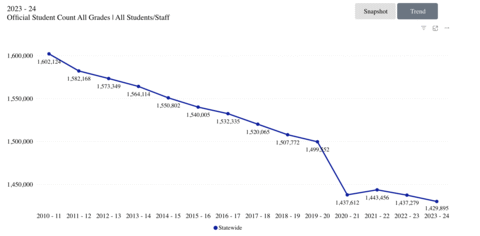Taxpayers rejecting pricier school bonds
Bond issue asking prices doubled over 24 years, but more spending hasn’t brought better academic results
Michigan taxpayers are rejecting more school bond issues compared to the beginning of the century, when the average debt request was less than half the current level.
The average school bond issue request increased from $21.7 million in 2000 to $44.6 million in 2024.
School districts usually ask for around 40-60 bonds annually, according to a Michigan Capitol Confidential review of a state website that tracks school bonds since 1996.
Michigan schools have asked voters to approve 60 school bonds so far this year. Voters approved 29 and rejected 32. Voters will decide another 22 school bond questions on Nov. 5, 2024, with the average request seeking $40 million.
In 2020, schools asked voters to approve 61 school bonds. Of those, 48 passed and 13 failed, giving school officials a success rate of 78%. The average school bond request then was $40.6 million.
In 2013, schools asked for 43 bond proposals with an average request of $16 million. Of those, voters approved 32, with an average of $17 million approved. They rejected 11, with an average dollar amount of $14 million.
In 2004, voters approved 45 school bonds and rejected 28 bonds at an average ask of $34M.
There are several reasons why bonds fail more often now than before, Leon Drolet, Macomb Township Treasurer, told Michigan Capital Confidential. Absentee voting allows groups opposed to school bonds to track and oppose measures by mailing pamphlets to voters on the same day they receive the ballots.
“There’s an increasing percentage of people who believe that the schools are becoming partisan as well,” Drolet said in a phone interview. “It may be that 20 years ago, people perceived their schools as a neutral entity that educates children... I think a lot of folks, whether through social media or another mechanism, have come to believe that schools are falling in line with more of a left-leaning worldview.”
Michigan schools received $5.6 billion in COVID funds and are now trying to sustain spending levels that have skyrocketed since the turn of the century.
In fiscal year 2000-2001, Michigan’s spending on the School Aid Fund reached $10.8 billion. By fiscal year 2023-24, spending had more than doubled to $21 billion, according to the nonpartisan Senate Fiscal Agency.
Higher school spending is also following fewer Michigan students as birth rates drop. More than 1.6 million students attended schools in 2010 compared to 1.4 million students in 2024, Michigan Department of Education data show.
Although funding is up, academic performance has dropped.
In Detroit, 90% of students in public elementary and middle school are either not proficient or only partially proficient in English, according to Molly Macek, education policy director at the Mackinac Center for Public Policy. Only 5% of eighth graders are proficient in math.
Michigan Capitol Confidential is the news source produced by the Mackinac Center for Public Policy. Michigan Capitol Confidential reports with a free-market news perspective.



.jpg.png)
 Michigan Education board member claims funding cuts after record funding
Michigan Education board member claims funding cuts after record funding
 Michigan spends $6.9M advertising 'cost-free' pre-K
Michigan spends $6.9M advertising 'cost-free' pre-K
 Michigan’s property taxes keep increasing above inflation
Michigan’s property taxes keep increasing above inflation

 McMorrow admits EV transition is government-driven
McMorrow admits EV transition is government-driven
 Michigan House Ethics Committee has not met since June
Michigan House Ethics Committee has not met since June
 Michigan data privacy legislation exempts governments
Michigan data privacy legislation exempts governments